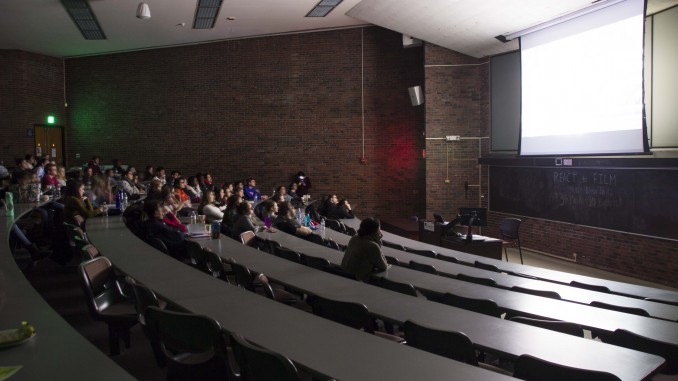
In our culture, film can be seen as a medium for entertainment and a means of escaping the harsh realities and injustices of day-to-day life. However, its dynamic use of auditory and visual storytelling endow it with the unique ability to force viewers to think critically about social issues that they often use cinema to get away from.
This is the goal behind director Marc Silver’s documentary “3½ Minutes, Ten Bullets,” which was screened in room 102 of the Lecture Center on the SUNY New Paltz campus on Thursday, March 3.
The film examines the tragedy, trial and turmoil surrounding the 2012 death of Jordan Davis, an unarmed black teenager who was fatally shot by white 45-year-old Michael Dunn at a Florida gas station, months after George Zimmerman’s acquittal in the death of Trayvon Martin.
The incident initiated when Dunn, who was parked next to Davis and his friends, objected to the volume of the ‘thug music’ that was coming from their car. A heated exchange ensued that eventually led to Dunn drawing a loaded handgun from his glove compartment and firing 10 rounds into the adjacent car.
Three of the bullets struck Davis, leaving the 17-year-old dead at the scene. Dunn and his defense claimed that he felt his life was in danger and therefore the shooting was justified under Florida’s Stand Your Ground Law.
The film shows the emotional anguish endured by the parents of Jordan Davis as well as Jordan’s very normal and stable upbringing, devoid of any criminality. Simultaneously, we see the slow unraveling of Dunn’s covert racism over the course of the trial, during which he was found guilty of all counts.
Dunn’s perceived need to respond with violent force to teenagers who were simply being teenagers underlies a cloaked racism prevalent across America which unjustly stereotypes black males as hostile threats, making their right to life disposable while the Second Amendment is propped up on a pedestal.
The screening was hosted by the SUNY New Paltz chapter of REACT to FILM, a nationwide, non-profit organization that aims to spark student engagement and dialogue on social issues through documentary films.
“I think film is an effective medium to get students to think about social issues because it’s a simple way to humanize complex situations,” said Hannah Fertig, a fourth-year student and President of the REACT to FILM New Paltz chapter. “I think when people read about things in the news they are able to separate themselves from the problem; whereas when people visually consume information they connect with it more.”
After the screening, a panel discussion was opened up in which members of the audience could engage faculty from the sociology department in a discussion about the film and the racial and social questions raised in it.
Reflecting on one student’s question about what could lead a person like Michael Dunn to hold such prejudices, Assistant Professor Tyrrell Connor pointed to a secondhand understanding of black people.
“When there’s a lack of interaction with people of color [for white people], they fill in the gap with pop culture,” Connor said. “Which in the case of black people, often paints them as drug dealers and gangbangers.”
Connor also stressed the need to redefine the way we think about racism.
“We teach kids that racism is an act that an individual performs with hate, but racism is a cultural force that can cause many well-meaning people to hold unfounded biases as well as an institutional force that leads to black men being locked up at disproportionately higher rates.”
Many of the students in attendance were profoundly impacted by the film, such as fifth-year marketing student Andrew Joseph.
“I got chills at some points,” Joseph said. “We see this type of discrimination towards minorities happening daily in different shapes and forms. I felt sad for his family but as the documentary went on I think I got more angry than anything.”
Fertig believes that it’s not just enough to merely watch and spectate, but that there must be an open and robust dialogue on these types of issues, which is why she encourages people to join discussions about diversity and race relations at the Sojourner Truth Library every Wednesday at 4:30 p.m.
